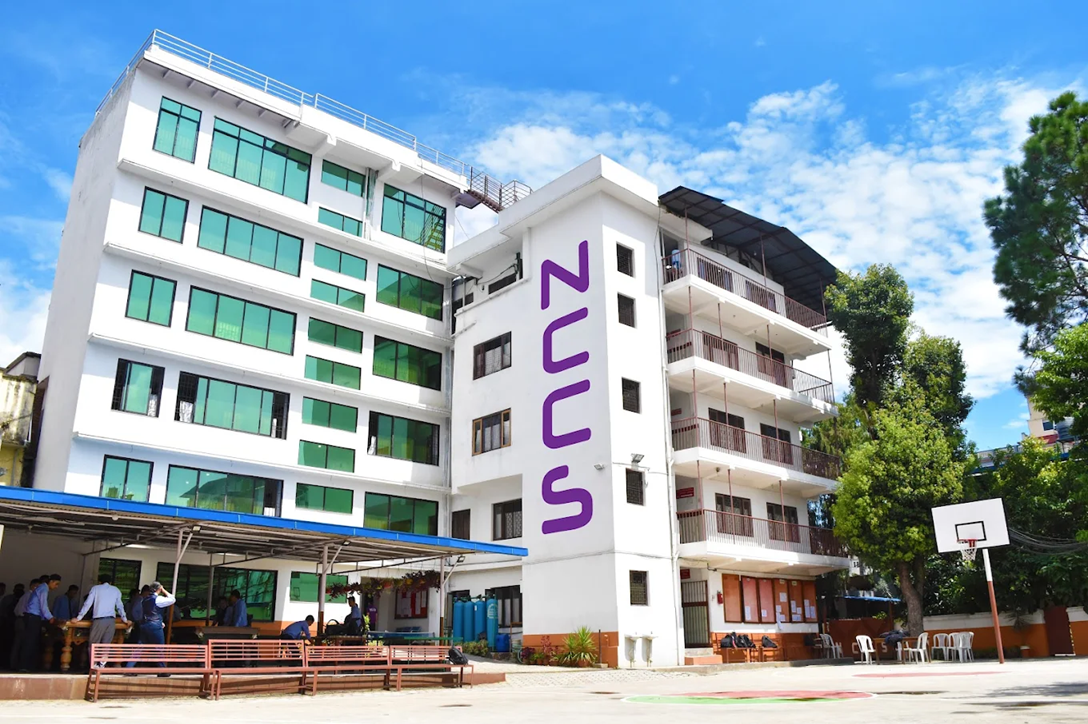Overview
BBM at National College of Computer Studies (NCCS), Paknajol, Kathmandu
Bachelor of Business Management (BBM) at NCCS, Paknajol, Kathmandu, follows Tribhuvan University (TU) standards across eight semesters.
You study management, accounting, finance, marketing, human resources, operations, business law, research methods, and information systems in a structured way.
The campus setting supports regular classes, guided assignments, presentations, and a project that helps you link ideas to workplace tasks.

Highlights
-
University: Tribhuvan University (Faculty of Management)
-
Duration: 4 years, 8 semesters
-
Delivery: Classes, labs for MIS/database tools, case work, presentations, field tasks, and a final project
-
Campus: Paknajol, Kathmandu
-
Focus: Management fundamentals, business analytics basics, MIS, entrepreneurship, and research
Curriculum Details
The semester plan builds from foundations to specializations.
Course titles follow TU’s structure; NCCS schedules sessions and assessments per the academic calendar.
Semesters I–II (Foundations)
-
Business English I–II
-
Business Mathematics I–II
-
Microeconomics and Macroeconomics
-
Financial Accounting and Cost/Management Accounting
-
Business Statistics
-
Principles of Management
Semesters III–IV (Core Business and Law)
-
Business Communication
-
Organizational Behavior and Human Resource Management
-
Fundamentals of Marketing
-
Essentials of Finance
-
Business Law
-
Business Environment in Nepal
Semesters V–VI (Technology, Research, and Enterprise)
-
Management Information Systems (MIS)
-
Database Management for Business
-
E-Business concepts and tools
-
Business Research Methods
-
Entrepreneurship and small business planning
-
Operations and supply topics covered through cases and practical tasks
Semesters VII–VIII (Specialization and Capstone)
-
Concentration courses in one area (Accounting, Finance, Marketing, or HR)
-
Strategic Management
-
Business Ethics and Corporate Social Responsibility
-
Project Report and Viva (capstone based on field/problem study)
Objectives
-
Build a clear grasp of how accounting, finance, marketing, HR, and operations support day-to-day decisions.
-
Help you read numbers, write concise reports, and present ideas to non-technical teams.
-
Encourage careful planning through case work, research steps, and a final project.
-
Support early career roles in Nepali organizations that value TU credentials and practical work habits.
Scope
Graduates work in banks, trading houses, hospitality firms, colleges, NGOs, and local units.
Entry roles include accounts support, finance and banking operations, sales coordination, HR assistance, and administrative posts.
Many continue to a master’s degree in management or prepare for competitive examinations.
Learning Outcomes
Students who complete BBM at NCCS typically can:
-
Prepare, read, and explain basic financial statements.
-
Use spreadsheets and simple databases to create reports for managers.
-
Draft marketing plans and sales summaries based on local market data.
-
Manage routine HR documentation and help run small events or training.
-
Conduct a guided research project and present findings in a clear format.
-
Communicate with teams, handle short deadlines, and document progress.
Skill Development Modules
-
Quantitative Tools: Business math, statistics, spreadsheet modeling, charts, and dashboards.
-
Accounting & Finance: Recording, reporting, budgeting basics, cash and cost control.
-
Marketing & Sales: Market mapping, product and pricing basics, promotion planning, channel notes.
-
HR & Organization: Job descriptions, attendance and payroll support, appraisal checklists, labor basics.
-
Law & Policy: Business law essentials, tax basics introduced through Nepal-focused cases.
-
MIS & Database: Tables, queries, forms, and reports for small business scenarios.
-
Research & Project: Proposal, data collection, analysis, and a capstone report with viva.
Teaching Methodology
Faculty use lectures for concepts and tutorials for practice.
You complete problem sets, short case notes, and group presentations.
MIS/database sessions run in labs so you learn by doing.
Guest talks and mini-seminars connect classroom work to local workplaces.
The library and NCCS online platform help you access references, past papers, and schedules.
Project supervision covers topic selection, timelines, drafts, and a final viva.
Admission Requirements
-
Completion of 10+2 or equivalent from a board recognized by TU.
-
CMAT conducted by TU (minimum score criteria as per the intake notice).
-
College selection steps as announced each session.
-
Submission of application form, academic certificates, character certificate, photographs, and citizenship or passport copy within deadlines.
-
Seat confirmation based on merit lists and notice timelines.
Career Opportunities
-
Accounting & Finance: Accounts assistant, billing support, junior finance roles.
-
Banking & Insurance: Teller or assistant roles, back-office support, customer service.
-
Marketing & Sales: Product coordination, sales support, field reporting.
-
HR & Administration: Documentation, payroll assistance, office coordination.
-
Entrepreneurship & Projects: Small ventures, event coordination, e-commerce support.
-
Further Study: Master’s level management programs and specialized certifications.
Scholarships and Financial Aid
Scholarship notices appear each intake under TU and campus policy.
Criteria may include entrance performance, academic standing, need considerations, and renewal rules.
You should track forms, required documents, and deadlines in the current session notice.
Why Choose This Course?
-
A semester plan that connects business subjects with MIS and database skills.
-
Practical tasks and a capstone that create evidence for your portfolio.
-
A campus environment that supports steady practice, presentations, and project reviews.
Conclusion
BBM at NCCS offers a structured path into business roles through balanced study, steady practice, and a final project.
Students who plan early, attend classes, and document work can present clear proof of skills for entry-level hiring in Nepal’s commerce and service sectors.






















